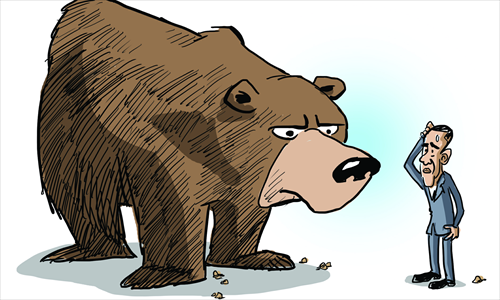Humiliation from Washington pushing Russia into action over Crimea

Illustration: Liu Rui/GT
Russian President Vladimir Putin has displayed such a tough attitude toward making Crimea part of Russia that he has surprised policymakers in Washington and Brussels.
Strategic distrust between the US and Russia has frozen to the lowest point since the end of the Cold War as the two have engaged in a direct and fierce confrontation surrounding mired Ukraine. Russia's move on the Crimea issue is an escalation of conflict instead of the end of the story.
If the agreement inked between ousted Ukrainian president Viktor Yanukovych and the opposition leaders had been implemented in a proper way, things could have turned out better than the current scenario.
Putin has no particular liking for Yanukovych, but could have accepted a mild opposition leader who would focus on anti-corruption, economic reform, take a smart attitude to Russia and not join the EU immediately after taking office.
The US has a geopolitical advantage with a mild Canada and a Mexico that poses no threat as neighbors. In contrast, Russia has no such advantage, with a small population scattered over a vast territory. Many of its neighboring countries have been suspicious of and even averse of Russia due to the historical record.
China also lacks the US geopolitical advantages. However, Washington has never seriously mulled why Beijing and Moscow feel insecure.
There is another cause for Beijing and Moscow to feel insecure. The two emerging countries with strong national pride are promoting important and arduous domestic reforms. Nothing is more important than a stable neighboring environment, which is why both Russia and China are increasingly staunch in safeguarding national security.
Both countries are great powers with nuclear weapons. When their vital interests are threatened, they will not care about any sanctions or even more severe costs.
Apparently, the Obama administration has underestimated Putin's reaction toward Ukraine's crisis.
The US has been heavily concerned about the color revolution and about humiliating Putin instead of responsibly assessing whether the Ukrainian opposition is justified and representative. At least, people in Crimea do not think Kiev's new government is completely legitimate.
Arrogance has defeated prudence. US policymakers once tried to make Moscow take the consequences, but Putin told US President Barack Obama that Russians are fed up with it.
After the end of the Cold War, Washington has been urging NATO to expand east and squeeze Russia's strategic space. Syria is the last stronghold of Russian influence in the Middle East, and Ukraine is at its door. Putin was forced to take a tough stance on Crimea, because the humiliation inflicted by the US and the EU on Moscow further united Russians in an unprecedented way.
If there had been no Ukrainian crisis, Moscow would have continued to be a key partner of Washington in addressing the Iranian nuclear issue, and their bilateral relationship would have crept forward.
If the US continues to press hard on China over Diaoyu Islands and the South China Sea, they may jeopardize the strategic opportunity of deeper cooperation on resolving North Korea's nuclear issue.
Washington must clearly define its key interests and refrain from acting willfully.
Washington's global strategy has been in the most important transitional period since the September 11 attacks.
Many US strategists contend that the biggest security threat of their country does not come from terrorism, but from traditional powers like China and Russia.
If Washington still refuses to take the key interests of Beijing and Moscow seriously and understand their feelings of insecurity, it will face more trouble.
The author is a research fellow with the Charhar Institute and an adjunct fellow with the Center for International and Strategic Studies, Peking University. opinion@globaltimes.com.cn